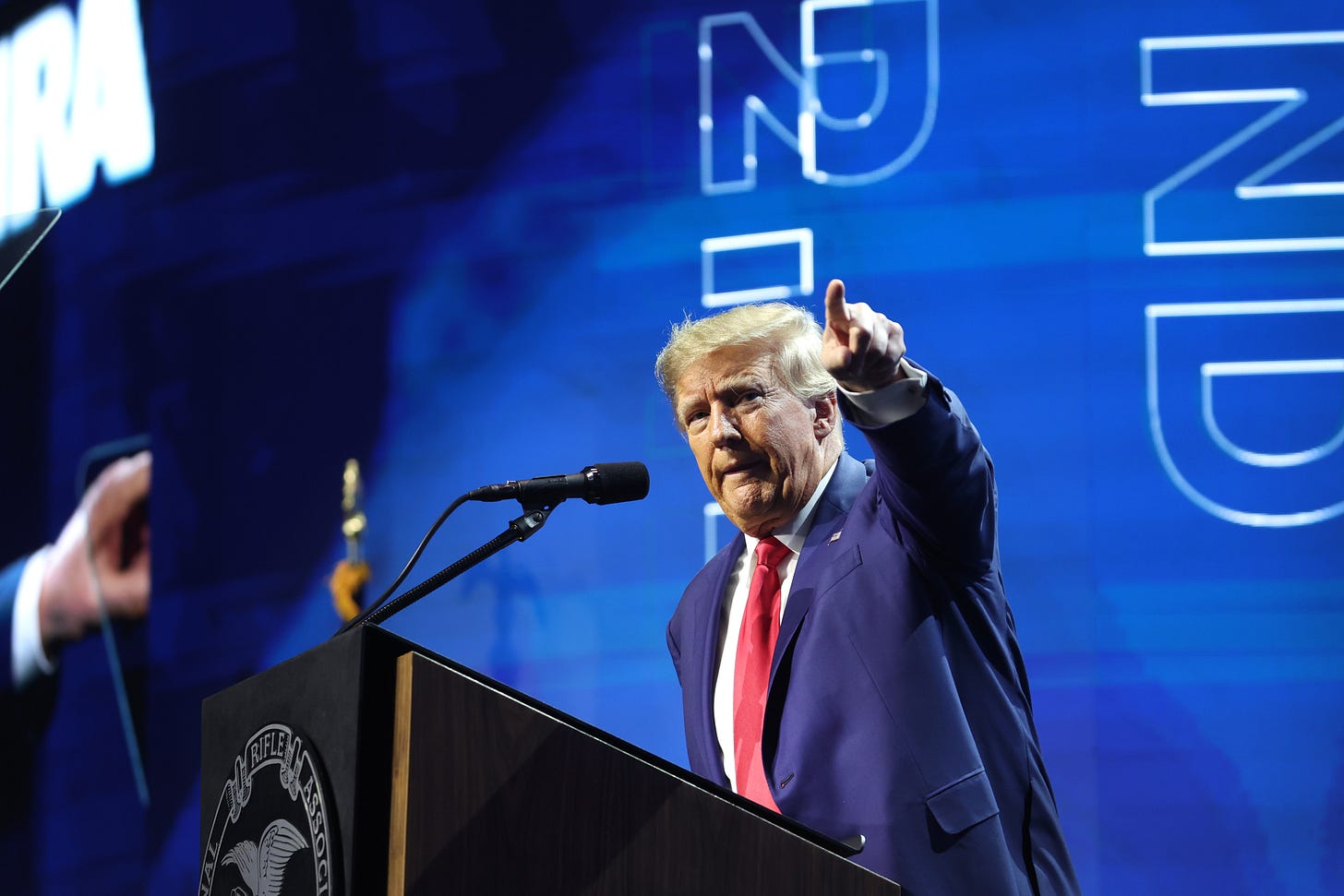The Rise of the Anti-Ideological Right—2
At their worst, ideological and anti-ideological politics terminate in different forms of tyranny

In my last post, I argued that one crucial thing that separates former president Donald Trump (and his supporters) from Florida Governor Ron DeSantis (and his supporters) is ideology. Not that the two men have different ideologies, but that DeSantis is an ideological candidate (as of the evening of Wednesday, May 24) while Trump is not.
I summarized the difference between ideological and non-ideological politics in the following way:
DeSantis says: Look at all these great policies I’ve enacted!
Trump says: I’ll kick the shit out of your enemies!
But this isn’t sufficient to differentiate between ideological and non-ideological forms of right-wing antiliberalism. My goal in this post is to go further in explaining this key differences between them, and to lay out the distinctive dangers of each.
Ideology v. Anti-Ideology
Ideology serves as a kind of rulebook or table of principles for partisan politics. Our side believes X, Y, and Z, so we must do A, B, and C. Ideological conservatism of the Reaganite variety, for example, was suspicious of big government and thought that if Washington would stop meddling in the lives and business-dealings of ordinary Americans, the country would thrive. So the Reagan administration cut taxes and regulations. It also appointed judges who (in theory) were committed to deferring to states and to legislatures on the grounds that the common sense that prevailed in the country-at-large was reflected more fully at the local level and in the directly elected branches of government.
The anti-woke ideology that DeSantis hopes to ride all the way to the White House has a very different understanding of government power. It maintains that the left’s “woke mind virus” is a major threat to the well-being of the country. DeSantis is therefore ready and willing to deploy government to combat it in corporations, universities, schools, and other private and public spaces. His record in Florida shows all the ways he’s been willing to do exactly that.
At first blush, it might look like Trump has a similar ideology of his own—one that’s anti-immigrant, anti-free trade, anti-woke, and so forth. But note that Trump promised to build a wall along the southern border to keep people from entering the country from Mexico but made very limited progress toward its completion in his four years in office. Note that he railed against the North American Free Trade Agreement but then endorsed and bragged about implementing a modestly adjusted version of the same agreement under a different name. Note that he railed again the threat of China on the campaign trail and slapped tariffs on Chinese imports once he became president but then resorted to flattering Chinese President Xi in the hopes of striking a new-and-improved Sino-American trade deal.
Go down the list of things Trump talked about at any given moment and you will probably find him taking the opposite position and supporting contrary policies at another time. He ran on giving all Americans access to affordable health insurance, but he went along with House Speaker Paul Ryan’s efforts to repeal the Affordable Care Act without an alternative replace it. He threatened to rain down “fire and fury” on North Korea but then talked about his great friendship with North Korean dictator Kim Jong-un. He attacked immigrants from “shithole countries,” but wanted to provide so-called Dreamers with a path to citizenship. He talked about putting women in jail for procuring abortions, but now he chastises pro-life activists for demanding draconian restrictions on the procedure. He both favored and opposed mask-wearing during the COVID-19 pandemic, just as he both favored and opposed a nationwide pandemic lockdown.
This is different than an ideological politician occasionally diverging from a list of rules or principles out of expediency, as Reagan did by accepting tax hikes on his watch and doing less to cut government than many on the right would have preferred. Politics in a democracy is always an art of the possible: you get the best you can in the given circumstances, which will often require compromises. But that’s not what Trump was and is doing. His only fixed rule or principle is this: Those leading the country have been a disaster, and I alone can fix it.
Modern ideological dictators are ascetics of a kind. Adolf Hitler, Joseph Stalin, and Mao Zedong devoted their lives to a cause.
But Trump’s only cause is himself. Somewhat like the ancient tyrants Plato and Aristotle analyzed, he is a political hedonist who acts as he does out of a craving for the pleasure that comes from being loved and cheered by a crowd.
The Good and Bad of Ideological Politics
Keep reading with a 7-day free trial
Subscribe to Notes from the Middleground to keep reading this post and get 7 days of free access to the full post archives.




